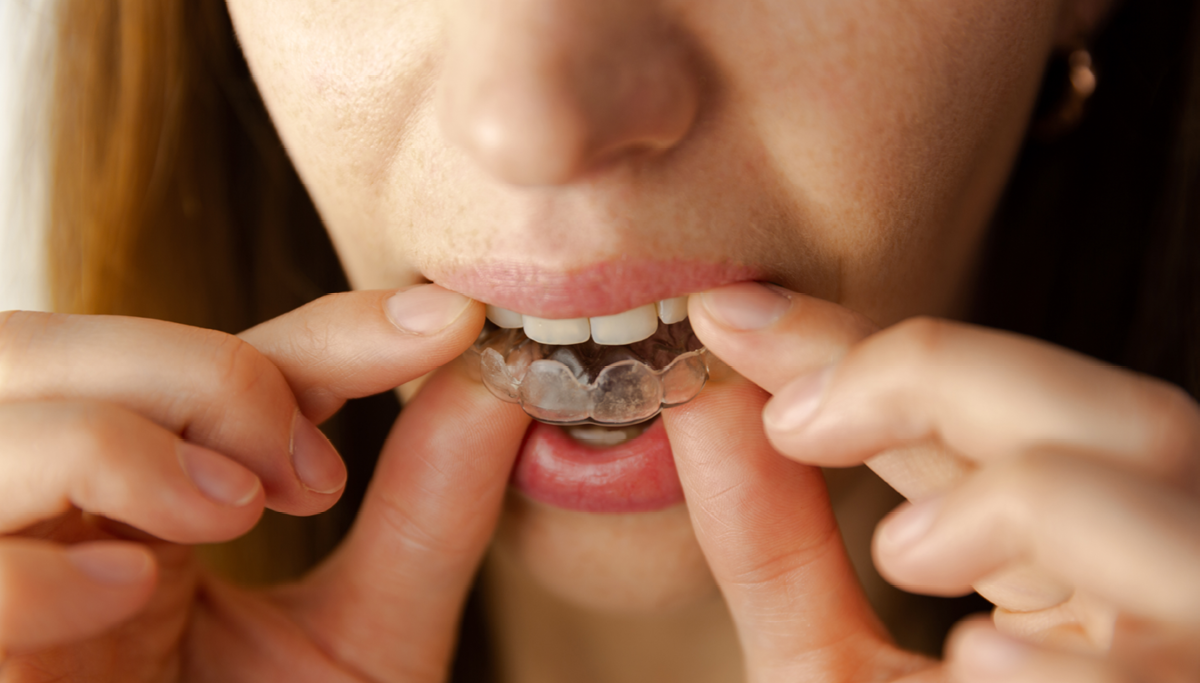What is an occlusal nightguard?
The term “occlusal” refers to the surfaces of your teeth that are used for chewing. When you are damaging those surfaces by clenching or grinding your teeth, an occlusal guard may be recommended by your dentist.
An occlusal guard, also referred to as a nightguard, bite guard, or bite splint, is a removable device that fits over your upper or lower teeth. It helps prevent damage to your teeth that can be caused by grinding and clenching, a destructive oral habit also known as bruxism.
While occlusal guards don’t necessarily stop you from grinding or clenching, they do help protect the tooth surfaces from damage caused by those actions and help alleviate the symptoms associated with bruxism.
Occlusal guards are like sports mouthguards but are typically less bulky and made of smoother, thinner plastic. They can be custom-made by your dentist to fit your mouth, bought at a neighborhood drugstore ready-made (boil-and-bite or microwaveable), or purchased online.
Do you need an occlusal guard or nightguard?
You may be wondering if you're in need of an occlusal guard or nightguard. While occasional teeth grinding or clenching should not be a major cause of concern, consistent, long-term bruxism can lead to pain, broken teeth, loss of tooth enamel, and in severe cases – loss of teeth.
Bruxism is a fairly common problem. It is estimated that about 10 percent of adults and as many as 15 percent of children are affected. This grinding and clenching typically occurs at night, but may also be a daytime habit, and most people are unaware they have the problem. Unless your sleep partner complains about the noise, your dentist is usually the first to recognize the damage to your teeth and raise concern.
Some symptoms that may indicate the need for an occlusal guard include:
- Teeth clenching and grinding
- Jaw pain or stiffness
- Fractured or worn-down teeth and dental restorations
- Loose teeth
- Temperature-sensitive teeth
- Headaches, earaches, toothaches in the morning
- Facial pain
- Disrupted sleep
- Sleep partner complains about the noise
Types of occlusal nightguards
There are three common types of occlusal guards used to limit the effects of bruxism. If you have any questions about which type is the best for you, then we recommend speaking with your dentist who will be able to advise.
- Soft nightguard – Used to alleviate symptoms for mild cases of bruxism. They fit comfortably and are usually easy to get used to wearing.
- Dual laminate nightguards – Designed for moderate to severe teeth grinders. They have a soft, comfortable, inner surface and a hard, durable outer surface.
- Hard nightguards – Used for very severe cases of bruxism. They are made from acrylic, are extremely durable and long-lasting, and will need to be custom fit by a dentist.
Other things to know about occlusal guards
Your occlusal guard is intended to make your mouth feel more comfortable. If it doesn’t, then you may not have the right fit. Your occlusal guard may need to be adjusted after placement, and, if it feels uncomfortable in any way or if you experience any pain, then it's best to let your dentist know. They’ll be able to help.
It is important to clean your occlusal guard before and after each wear as they are prone to bacteria or other microorganisms. Poor care could lead to greater oral health problems or the spread of other diseases.
Occlusal guards won’t stop you from clenching or grinding, but they can be an effective way to protect your teeth during the day or night if you suffer from unconscious destructive oral habits. If you have any questions about whether you need an occlusal guard, we visit your dentist for an evaluation. Your dental care team will be able to diagnose any bruxing damage and help guide you through treatment options.

